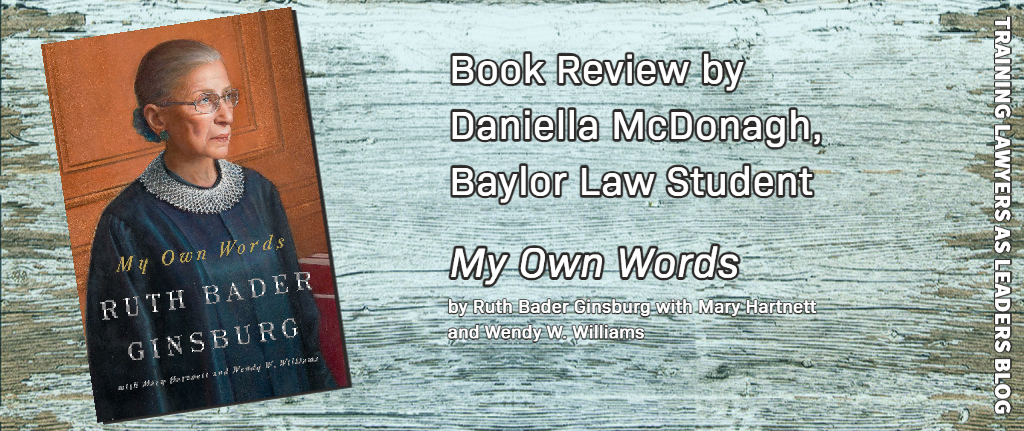Guest Post by Baylor Law Student, Daniella McDonagh

The following post is a book review written by Daniella McDonagh, a student in our Winter 2022-23 Leadership Class. In Chapter 21 of Fundamentals of Lawyer Leadership, we encourage students to view life as a lawyer as a lifelong pursuit of purposeful learning and growth as they serve, influence, and impact their clients and communities. Daniella writes about lessons and advice she finds in My Own Words, a biographical collection of Justice Ruth Bader Ginsburg’s speeches, articles, and lectures. I hope you enjoy it as much as I did!
– Leah
Advocate, way-paver, justice seeker, and fighter are all qualities that commonly come to mind when thinking of a successful leader like Ruth Bader Ginsburg. But, what may not come to mind as commonly, is the quality of being an eternal student. My Own Words by Ruth Bader Ginsburg illuminates that besides these common qualities of a leader, the quality of being an eternal student made Bader Ginsburg the “Notorious RBG” and the inspiring leader that she was and continues to be remembered for today.
Bader Ginsburg was a student of leaders who came before her, illuminating little-known historical figures and spotlighting those who helped pave the way for her own opportunities and accomplishments. She appreciated the paths marked by others – others whose names are unknown and overlooked, such as Belva Lockwood, who was the first woman to gain admission to the United States Supreme Court Bar, and Arabella Mansfield, the first woman to gain admission to practice law in the United States; and Florence Allen, the first woman to serve on an Article III federal court. Bader Ginsburg recognized that to be a future leader, and she must study the leaders – both the famously revered and the nameless unknowns – of the past.
Additionally, she studied social movements, like the civil rights movement, to mimic the strategy of educating judicial audiences in measured movements in ways digestible by and appeasing to the decision-makers on the matter. Bader Ginsburg also expanded her studies to other legal systems – she studied what other leaders did well and what could be improved if similar methods were applied to American systems and leaders.
Like any successful leader, Bader Ginsburg was a student of the audience – she studied her audience to best understand how to communicate productively and effect change in dissenting minds. She demonstrated this best when seeking change in contentious areas, such as women’s rights and civil rights, during the peak of controversy. Bader Ginsburg recognized that speaking to all audiences as though addressing one’s home crowd could be counterproductive. She proved that productive communication and effective change only occurs when leaders study their audiences and cater to the specific thought processes, concerns, and priorities of the audience.
Bader Ginsburg was also a student of words – she understood the powerful presence of the right words at the right time and the power of silence. She especially demonstrated this wisdom and balance of speech and silence through her dissenting opinions. Throughout her career on the Supreme Court bench, there were terms where Bader Ginsburg did not author any dissents, but that was not for lack of anything to say. Instead, she recognized that when she did use her voice, her words would be given more weight and garner more attention than those justices whose voices traditionally dominate and overwhelm the discussion. Furthermore, when she did dissent, she emphasized the importance of disagreeing with civility. Bader Ginsburg demonstrated that leaders bring dissenters to the light; leaders do not fault dissenters for being wrong. To put this into practice, she would transform from the student to the teacher and teach the other justices everything she learned and understood on this topic through her experience as an open-minded, absorbent student.
What was noticeably absent from Bader Ginsburg’s My Own Words, was her own words about herself. Bader Ginsburg exemplified a true student leader in that she focused on the achievements of other people, other movements, and other legal systems, but neglected to acknowledge her own remarkable achievements as a leader. I recommend My Own Words for those seeking to improve their leadership skills because Bader Ginsburg does not tell you how to be a leader, nor does she tell you how she herself is a leader; instead, she actively embodied what a leader is with every word she wrote and every word she spoke. This book does not lay out a five-point plan that people are unlikely to follow, nor does it suggest theoretical advice that is impractical to implement. Rather, this book provides a glimpse into the thoughts and opinions of an exceptional leader and demonstrates the remarkable result of dedicating your life to something so simple and achievable – being a student.




